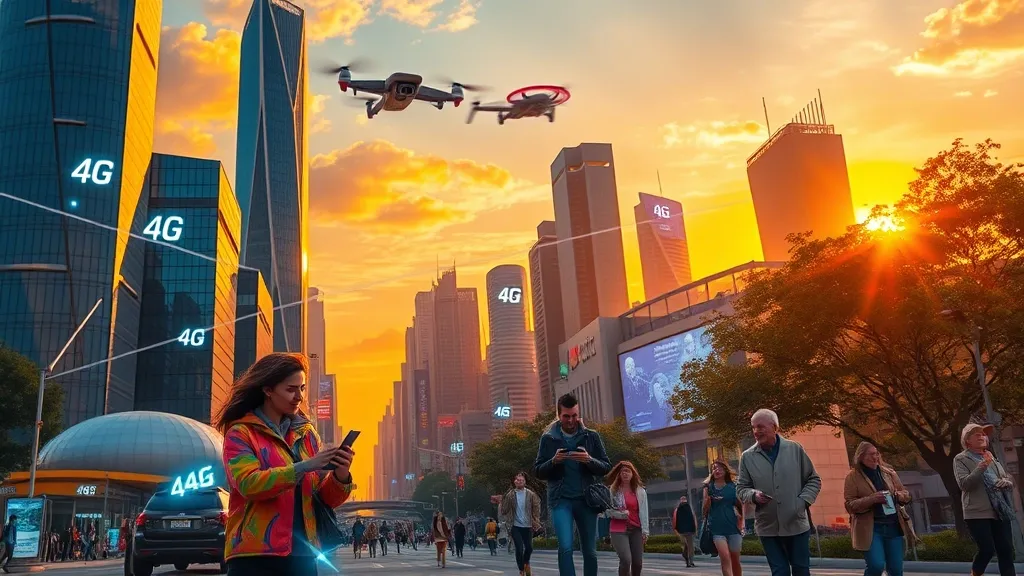The Invisible Handshake: How Quantum Computing Will Rewrite Reality
Okay, let’s dive into something that sounds like it’s straight out of a sci-fi movie: quantum computing. Seriously, it’s like the universe’s way of saying, “Hold my drink; I’m about to blow your mind.” So, what’s the deal with quantum computing? Basically, it’s a whole new way of processing information that plays by the bizarre rules of quantum mechanics. Think of it as the nerdy cousin of your regular computer who’s just way cooler and can do things you never thought possible.
So, what makes quantum computing so special? For starters, it uses qubits instead of bits. A bit, as you probably know, can either be a 0 or a 1. But a qubit? It can be both at the same time, thanks to a little thing called superposition. It’s like if you could be at two parties at once—imagine the FOMO! This ability to exist in multiple states allows quantum computers to process massive amounts of data way faster than traditional computers can. It’s like comparing a snail to a rocket ship. Seriously.
And then there’s entanglement. No, not the kind of entanglement that comes from trying to untangle your headphones. In quantum terms, it means that qubits can be linked together, so the state of one qubit can depend on the state of another, no matter how far apart they are. It’s like having a secret handshake with your best friend that works even when you’re miles away. This means quantum computers can solve complex problems much more efficiently, which could revolutionize fields like cryptography, medicine, and even climate modeling. How cool is that?
Now, let’s be real for a second. This tech isn’t just going to magically appear and fix all our problems overnight. There are still tons of challenges to overcome, like error rates and qubit stability. But still, the potential is huge. Imagine a world where diseases are cured faster, and we can predict climate changes with accuracy. It’s like having a crystal ball but way cooler and probably less cheesy.
In a nutshell, quantum computing could change how we see the world and interact with it. It’s still in its early days, but if you’re not paying attention to this tech, you might want to start. Who knows? The future might just be a quantum leap away!
2. Data Is the New Oil, But What Happens When It Runs Dry?
Okay, so we’ve all heard that saying, right? “Data is the new oil.” It’s catchy, it sounds smart, and it makes total sense in today’s digital age. Think about it: companies are mining data like it’s some precious resource. They’re drilling deep into our browsing habits, social media likes, and even what we had for breakfast. I mean, who knew my avocado toast was worth so much?
But here’s the kicker—what happens when that data runs dry? I mean, can you imagine a world where companies are scrambling to find the next big thing to sell us? It’s kinda wild to think about. If data is the new oil, then we’re basically sitting on a ticking time bomb. At some point, we might hit peak data, and then what?
- Do companies pivot to selling us other resources? Like, Hey, instead of targeting your ad for that cool jacket you just looked at, how about we sell you some good ol’ fashioned sunshine?
- Or do they start getting desperate and trying to extract data from, I don’t know, our dreams? “Hey, did you dream about flying? Here’s an ad for a jetpack!”
It gets a bit dystopian if you think about it too much. Honestly, it’s like we’re all living in some sci-fi movie where data is the lifeblood of the economy. And while that’s super cool for tech companies, it raises some serious questions about privacy and sustainability. Once everyone has harvested their data, what’s left for the new guys? It’s like an oil rush gone wrong.
Plus, as the digital landscape evolves, so does our relationship with data. People are starting to wake up to how much they actually give away. I mean, I don’t know about you, but I’m not super keen on my online habits being turned into a product. It’s kinda like selling your soul for a discount on a pair of shoes. The more we realize this, the more we might start hoarding our data like it’s the last cookie in the jar. And trust me, no one wants to be that person.
So, as we keep digging for data, we gotta think about what happens when it’s all gone. Will we find new sources of information, or will we be left in a data desert? Only time will tell, but let’s hope it’s not too dry out there.
The Human-AI Tango: When Machines Start to Understand Us Better Than We Do
You ever get that weird feeling when your phone suggests a song or a restaurant that’s *just* what you were thinking? It’s kinda creepy, right? Like, how does it know me so well? Welcome to the world of AI, where machines are starting to understand us better than we understand ourselves. It’s like having a super smart buddy who knows all your quirks and preferences, but without the awkward small talk.
AI technology has made some serious leaps in recent years. I mean, we’ve gone from flip phones to smartphones that can practically read our minds. And while it’s super convenient, it also raises a ton of questions. Are we okay with machines knowing us this well? Or are we just a little too cozy with our digital pals? 🤔
- Personalization: AI algorithms analyze our behavior, preferences, and even our moods. They can recommend shows on Netflix, products on Amazon, or even the perfect playlist for a rainy day. It’s like having a personal shopper, therapist, and DJ rolled into one.
- Predictive Analytics: Ever noticed how some apps can predict what you’re going to buy next? It’s almost like they can read your mind. They track your patterns and make educated guesses about what you might want. Kinda fascinating, but also a tad alarming.
- Empathy Simulation: Some AI systems are even designed to recognize human emotions. They can analyze your tone of voice or facial expressions to gauge how you’re feeling. I mean, how wild is that? Imagine having a robot that can comfort you when you’re down. It’s like having a therapist who never runs out of coffee!
But here’s the kicker: as much as AI gets us, it still lacks that human touch. Machines can crunch numbers and analyze data like champs, but they don’t *feel* what we feel. They don’t have experiences, memories, or that awkward moment when you realize you’re wearing mismatched socks. So, while AI might know your favorite pizza topping, it doesn’t know why it makes you feel all warm and fuzzy inside.
In the end, the human-AI relationship is a delicate dance. We rely on these machines to enhance our lives, but we gotta remember what makes us human—our emotions, our quirks, and our ability to connect on a deeper level. So, let’s embrace the tech, but not lose sight of what makes us, well, us!
4. Digital Immortality: Are We On the Cusp of Living Forever in the Cloud?
So, let’s talk about digital immortality. Sounds kinda sci-fi and a little creepy, right? Like, are we really gonna upload our brains into the cloud someday? Picture this: you’re scrolling through your social media feed and boom, there’s your great-great-grandma, sharing her daily thoughts on the latest cat meme. Wild!
The idea of living forever in the digital realm has become more than just a fantasy. With advances in AI, data storage, and even neuroscience, some folks are seriously considering the possibility of preserving our minds and personalities online. I mean, if we can save our selfies forever, why not our consciousness?
Companies are already working on technologies that could allow us to create a digital version of ourselves. Ever heard of “mind uploading”? It’s basically the concept of scanning your brain at a super-detailed level and transferring that data into a computer system. Sounds nuts, but researchers are doing crazy things with brain mapping. I can barely keep my own thoughts organized, but hey, maybe someday I’ll have a backup!
But here’s the kicker: is living forever in the cloud really all it’s cracked up to be? Imagine the social media drama that could unfold! You might end up ghosting your own digital self after a messy breakup—talk about awkward. Plus, there’s the whole issue of privacy. Who’s gonna own your data once you’re up there? Could your digital persona start posting stuff you’d never approve of? Yikes!
- What if your digital self started giving advice on things you don’t even believe in?
- Would your friends still visit your virtual grave if you decided to “log out” for good?
And let’s not forget about the ethical concerns. If we can upload minds, what does that mean for life and death? Is it really living if you’re just a series of 1s and 0s floating in cyberspace? It’s like the ultimate “to be or not to be” dilemma, but with Wi-Fi.
In a world where technology changes faster than you can say “digital footprint,” it’s tough to say where we’re headed. Maybe one day, we’ll all have a virtual version of ourselves hanging out in the cloud. Or maybe we’ll realize that living forever isn’t all it’s cracked up to be. Either way, it’s a wild ride, and I’m here for it!


